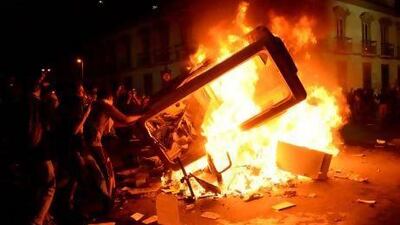RIO DE JANEIRO // Rio police fired tear gas and rubber bullets in clashes with young protesters yesterday, after tens of thousands rallied in the major Brazilian cities against the huge costs of hosting the 2014 World Cup.
In the country's largest protests in 20 years, more than 200,000 people marched across the country to vent their anger at the government's lavish spending in demonstrations which were initially triggered by a rise in bus fares.
In Rio de Janeiro, where some 100,000 people marched, riot police were forced to use tear gas and fire rubber bullets to disperse young people who set cars on fire, broke bank windows and raided stores.
Small groups of masked youths also engaged in acts of vandalism near Rio's state legislative assembly. Authorities said at least five policemen were hurt in the unrest.
Acts of vandalism were also reported in Porto Alegre, and a 18-year-old youth was reported in stable condition in a Belo Horizonte hospital after falling from an overpass during the protest.
The protests tapped widespread resentment over the huge costs of hosting the Confederations Cup and next year's World Cup, while this emerging country struggles to breach the chasm between the haves and the have-nots.
In the capital Brasilia, more than 200 youths briefly occupied the roof of the National Congress. After negotiations with police, a boisterous crowd agreed to leave, chanting and waving placards as security forces ringed the building.
Later, an estimated 5,000 youths formed a human chain around Congress. Police increased security around the building and the presidential palace.
In Sao Paulo, the country's economic capital and most populous city, an estimated 65,000 staged a generally peaceful march, with no repetition of the violence that marred similar protests last week.
Demonstrators lit a small fire outside the state governor's office but police, who generally kept a low profile, barred them from entering the premises.
"Peaceful demonstrations are legitimate," said the president, Dilma Rousseff. "It is natural for the young to demonstrate."
Diyo Coelho, 20, who marched with friends carrying flowers in Sao Paulo, said he was protesting for a myriad of reasons.
"I came because I want Brazil to wake up. It's not just to protest the higher transport fares, but also because of shortcomings in education and health."
Daiana Venancio, a 24-year-old lawyer marching in Rio, echoed those sentiments.
"I am here to show that Brazil is not just about football and partying. We have other concerns, like the lack of investments in things that really matter, like health and education," she said.
Some 30,000 protesters marched in Belo Horizonte, 10,000 did so in Curitiba and another 10,000 in Belem. Smaller demonstrations were held in Fortaleza, Salvador and other cities, including Porto Alegre where some 3,000 demonstrators marched outside the City Hall.
Police there intervened after acts of vandalism by youths who set a bus on fire.
The protests were triggered by a hike in mass transit fares that began more than a week ago in Sao Paulo.
The unrest rapidly spread to other cities, with demonstrators also focusing on Dh55.05 billion the government is allocating for the two football events. The demonstrators want these resources to be earmarked instead for health care and quality education.

